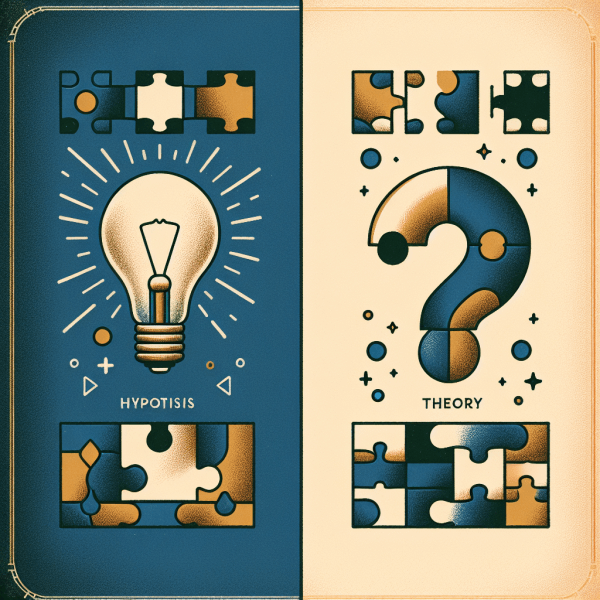The terms 'hypothesis' and 'theory' are frequently used in scientific discourse, yet they represent fundamentally different concepts in the landscape of empirical research and scientific inquiry. This essay seeks to delineate the distinctions between these two terms, exploring their meanings, implications, and roles within the scientific method.
Defining 'Hypothesis'
A hypothesis is a testable statement or prediction about the relationship between two or more variables. It is often formulated before conducting research and sets the stage for experimentation and investigation. A good hypothesis is typically based on previous observations or existing knowledge and is specific enough to allow for empirical testing.
For example, one might propose a hypothesis such as: "Increasing the amount of sunlight will lead to greater growth in tomato plants." In this case, the variables are the amount of sunlight and the growth of tomato plants. This hypothesis can be tested through controlled experiments.
Defining 'Theory'
In contrast, a theory is a well-substantiated explanation of some aspect of the natural world that is based on a body of evidence gathered through repeated experiments and observations. Theories typically arise after numerous hypotheses have been tested and validated, leading to the development of a coherent framework that explains a variety of phenomena.
For example, the theory of evolution explains the diversity of life on Earth through the processes of natural selection and genetic variation, incorporating evidence from multiple fields such as genetics, paleontology, and ecology. It is supported by a vast range of empirical data and provides a comprehensive explanation for how species change over time.

Key Differences
- Stage in the Scientific Method: A hypothesis is often the starting point for scientific investigations, while a theory is the culmination of extensive research and testing.
- Testability: Hypotheses are designed to be testable and falsifiable; they can be confirmed or rejected based on experimental results. Theories, while also subject to testing, are typically broader in scope and can integrate multiple hypotheses.
- Evidence: A hypothesis may be supported or refuted by a single study, whereas a theory is built upon a substantial body of evidence collected from various studies over time.
- Flexibility: Hypotheses can change rapidly as new data emerges, while theories tend to be more stable, though they can still evolve with significant new findings.
Conclusion
In summary, while the terms 'hypothesis' and 'theory' are sometimes used interchangeably in casual conversation, their differences are significant in the field of science. A hypothesis represents an initial educated guess that can be tested, while a theory embodies a comprehensive and well-supported explanation of a phenomenon developed over time. Understanding these distinctions is essential for communicating effectively about scientific concepts and encourages a more precise use of language in both academic and public discussions.
Example Usage in Context
In the realm of climate science, a researcher might propose a hypothesis: "If carbon dioxide levels in the atmosphere increase, then global temperatures will also increase." After conducting a series of controlled experiments and observing climate data, this hypothesis could contribute to the development of a theory that explains the mechanisms of climate change.








Have a discussion about this article with the community:
Report Comment
We're doing our best to make sure our content is useful, accurate and safe.
If by any chance you spot an inappropriate comment while navigating through our website please use this form to let us know, and we'll take care of it shortly.
Attachment
You need to be logged in to favorite.
Log In